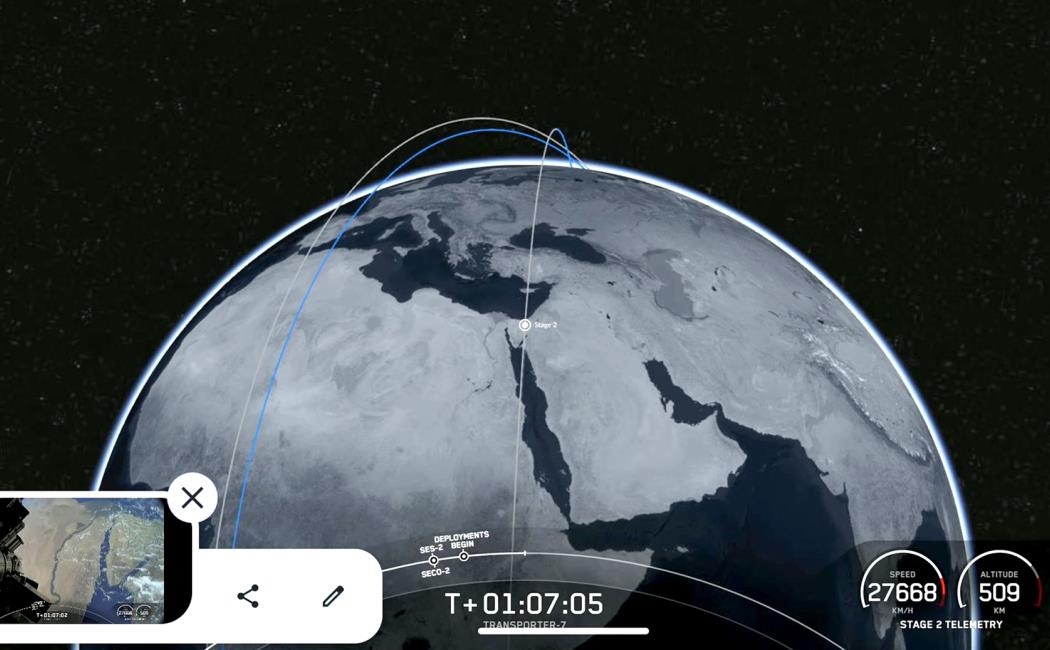
KAUST launches satellite to aid Saudia Arabia and other countries for advanced Earth observation research
10 April, 2023
King Abdullah University of Science and Technology (KAUST) has successfully launched a Cubesat satellite with its partner Spire Global on the SpaceX Transporter-7 mission from Vandenberg Space Force Base in the United States.
The satellite aims to collect high-quality and high-resolution data across global terrestrial, coastal and ocean ecosystems to help Saudi Arabia observe and characterize its unique natural resources.
The 6U satellite hosts a hyperspectral camera with advanced on-board processing capabilities in combination with Spire’s Global Navigation Satellite System-Reflectometry (GNSS-R) sensor payload, and will collect insights on Earth surface features such as the condition of plants, soils and water.
“We're lauching state-of-the-art technology on this satellite platform,” said Matthew McCabe, professor of remote sensing and water security, and director of the Climate and Livability Initiative at KAUST. “The hyperspectral imager is not only collecting imagery, it also integrates with onboard processing that allows analysis of the data even before it is returned to the ground. The combination of this capability with two unique sensors — the GNSSR and the hyperspectral — offers one of the first in-orbit demonstrations of such technologies. It’s the mix of cutting-edge imaging and on-board analysis that makes this such an exciting mission.”
Apart from providing enhanced Earth observation capabilities, the satellite will yield data that can help advance Vision 2030 goals, especially those related to protecting and restoring the environment. For example, the hyperspectral imager can be used to characterize terrestrial and marine systems, allowing an assessment of the condition of rangelands, soils, mangroves and other plant communities— delivering information that can be used to understand the regions unique ecosystems, and help to better monitor and manage their health.
“It's shared knowledge, and a shared community resource. Developing a community of scientists and collaborators who can access this data will bring global perspectives to local and regional questions that we’re trying to address,” McCabe said.
Though the mission will image the Saudi Arabian peninsula and surrounding region, the satellite has the capability to gather information and images from anywhere on Earth.
McCabe added that the KAUST mission is an example of a growing footprint in the space sector, noting that the Saudi Space Commission has ambitious plans to develop the local space economy. “This is the type of mission that we want to be able to see into the future — building innovation and technology in the Kingdom, training the next generation of scientists and engineers, and facilitating further space exploration from Saudi Arabia.”
Watch the interview with Professor Mathew F McCabe on the satellite launch here.
About KAUST
Established in 2009, King Abdullah University of Science and Technology (KAUST) is a graduate research university devoted to finding solutions for some of the most pressing scientific and technological challenges in the world as well as Saudi Arabia in the areas of food and health, water, energy, environment and the digital domain. KAUST is a curiosity-driven, interdisciplinary problem-solving environment, with state-of-the-art labs, distinguished faculty and talented students.
KAUST brings together the best minds from around the world to advance research. More than 120 different nationalities live, work and study on campus. KAUST is also a catalyst for innovation, economic development and social prosperity, with research resulting in novel patents and products, enterprising startups, regional and global initiatives, and collaboration with other academic institutions, industries and Saudi agencies.
For additional information, visit www.kaust.edu.sa.
About Spire Global, Inc.
Spire (NYSE: SPIR) is a leading global provider of space-based data, analytics and space services, offering access to unique datasets and powerful insights about Earth from the ultimate vantage point so that organizations can make decisions with confidence, accuracy, and speed. Spire uses one of the world’s largest multipurpose satellite constellations to source hard to acquire, valuable data and enriches it with predictive solutions. Spire then provides this data as a subscription to organizations around the world so they can improve business operations, decrease their environmental footprint, deploy resources for growth and competitive advantage, and mitigate risk. Spire gives commercial and government organizations the competitive advantage they seek to innovate and solve some of the world’s toughest problems with insights from space. Spire has eight offices across the U.S., Canada, UK, Luxembourg and Singapore. To learn more, visit www.spire.com.